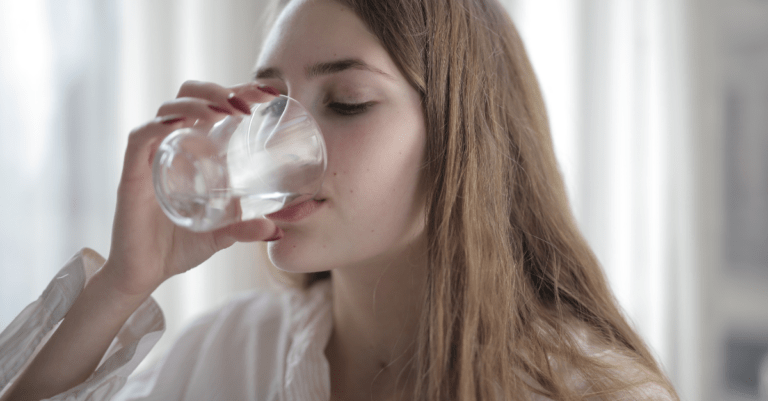“I am in my first year of pharmacy school, so naturally I have to eat a lot of those quick and easy foods that contain a ton of sodium. Would drinking more water help the body to eliminate the excess sodium?”
Hang on just a second, Eddie! Before I weigh in on your question about water and sodium, who says that being in school means that you have to eat a lot of high-sodium foods?
Being short on time or money doesn’t necessarily mean that you have to survive on fast food and vending machine snacks! For more strategies on eating healthy when time, money, and/or space are tight, please check out this two-part series on Healthy Eating for College Students as well as this episode on Stocking a Healthy Kitchen on a Budget.
When you are forced to grab a meal on the run, it’s gotten easier and easier to find healthy options. Even gas stations and drug stores now regularly stock things like baby carrots and hummus, Greek yogurt, cottage cheese, hard boiled eggs, and fresh fruit. So, I’m afraid that being in pharmacy school doesn’t give you a free pass to spend the next two years eating potato chips and Cheez whiz!
Sponsor: Audible.com, the Internet’s leading provider of audiobooks with more than 100,000 downloadable titles across all types of literature, including fiction, non-fiction and periodicals. For a free audiobook of your choice, go to this link
And now, to get back to your question:
Can Drinking More Water Cancel Out Too Much Sodium?
Eating a lot of salt can cause your body to retain more water and this can lead to a number of problems, such as increased blood pressure and swelling of the feet and other tissues in the body. After a particularly salty meal, drinking some extra water might help flush both the extra sodium and any retained fluids from the body. If your sodium intake is chronically high, though, upping your water intake probably isn’t going to have much effect on your fluid balance.
People who have high blood pressure, impaired kidney function, circulatory problems, or various other health conditions often need to limit their sodium. And for folks with these issues, consuming extra fluids is not an effective way to offset sodium intake—and might even make the situation worse.
Assuming, however, that you’re in good health, a more effective way to balance the sodium in your diet—and increase the nutritional quality of your diet at the same time—might be to increase your potassium intake.
Increase Potassium to Balance Sodium
In case you haven’t noticed, getting everyone to cut down on salt is a big priority for government health agencies these days. After all, lots of big studies have linked diets high in sodium with a lower life expectancy. Personally, I think this effort is slightly off-target.
If you widen the focus a bit to include nutrients other than just sodium, a different picture emerges. People whose diets are high in sodium and low in potassium are, indeed, at high risk. But get this: People whose diets are high in sodium and also high in potassium have about the same risk as people whose diets are low in sodium. In most people, high potassium intake may largely offset the negative effects of high sodium intake.
There are a couple of explanations for this. One is purely biochemical: Sodium and potassium work in concert to regulate the balance of fluids in and around your cells, affecting things like blood pressure and kidney function. Not surprisingly, this collaboration functions best when the two are roughly in balance.
The second explanation is more indirect. Most of the sodium in the modern diet comes from processed and pre-packaged foods. Potassium, on the other hand, comes from fruits, vegetables, meat, eggs, dairy products, and other whole foods. A diet that’s high in sodium and low in potassium—the profile that’s associated with the highest risks—is likely to contain mostly processed foods and not very many whole foods. It certainly doesn’t surprise me that this dietary rate is associated with higher rates of disease.
What’s Wrong with Low Sodium Diets?
That’s why I think focusing entirely on sodium is the wrong solution. For one thing, it’s not working: People simply don’t want to eat bland, low-sodium foods. For another thing, it completely ignores the other side of the equation: All the positive benefits of potassium-rich foods. In my opinion, a modest reduction in sodium (and processed foods) accompanied by an increase in potassium (and whole foods) would do a lot more good and be a lot more palatable than simply cutting down on salt.
While the government is focused on getting the food industry to produce more low-sodium processed foods, I’d rather encourage people (including you, Eddie) to replace some of the processed foods in their diet with more whole foods. Not only will you be reducing sodium, you’ll also be increasing the overall nutritional quality of your diet!
Keep in Touch
If you have a suggestion for a future show topic or would like to find out about having me speak at your conference or event, send an email to nutrition@quickanddirtytips.com. You can also post comments and questions on my Nutrition Diva Facebook Page. I answer a lot of listener questions in my free weekly newsletter, so if you’ve sent a question my way, be sure you’re signed up to receive that.
Drinking Water photo from Shutterstock.




